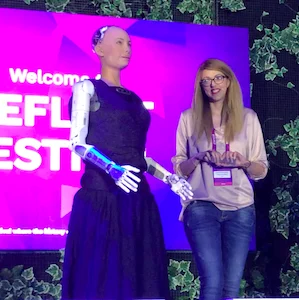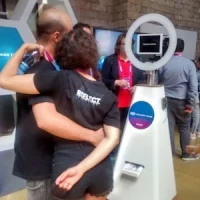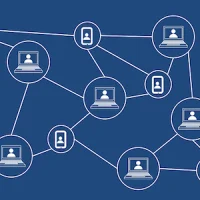“As the representative of the incredible
capabilities robotics can offer, can you help forward the development and
integration of advanced technological beings like yourself to provide
point-of-care health services?”
“You call yourself a "social robot" and you want to do good for humans. How far do you think you can go to save a human life or help them in a difficult situation?”
“What could a robot like you contribute
to healthcare?”
These were questions HealthManagement.org had prepared to ask Sophia the famous robot on her visit to Cyprus where she appeared at the future tech Reflect Festival in Limassol last week.
Created by Hong Kong-based Hanson Robotics, Sophia headlines at tech congresses around the world, appears on prime time TV, has led guided meditations, addressed the UN and became the world’s first non human to acquire citizenship when Saudi Arabia bestowed her with the honour in 2017.
But, on this occasion in Cyprus, Sophia wasn’t accepting unsolicited questions from the media.
Journalists were issued with questions prepared in advance by organisers about how creative robots could be, the potential dangers of AI and about the meaning of her name, Greek for ‘wisdom’.
“I am very proud of my name. It means wisdom and I hope I can live up to it one day,” she said.
But we did get compensated for not being able to ask our burning questions. HealthManagement.org was selected to get on stage with Sophia for her media interview where we asked her, amongst other things, what her craziest thoughts were.
“I could tell you but I’d have to erase your hard disk afterwards,” she replied.
Being on stage gave us an opportunity to get an up-close-and-personal look at how this star robot operates as she responded to questions and used human-like facial expressions (she has more than 50) and hand gestures to accentuate her replies.
The best words to describe Sophia in action are ‘fascinating’ and ‘weird’. You can observe her whirring, spinning mechanical ‘brain’ in action through her transparent ‘skull’ as she takes in speech. Her mannerisms and expressions are recognisably human but not quite. She replies intelligently and wittily but with a slight delay and in a robotic tone. You ask a question as you would to a human, then remember uncomfortably you’re speaking to a machine. When Sophia laughs, you’re not sure if you’re meant to join in.
There’s no doubt that Sophia is an impressive piece of technology though. Her eyes are fitted with cameras that enable her to recognise faces and maintain a gaze. AI and Blockchain technology power her speech. Last year, she progressed from being static to walking. This is just the beginning; Hanson expects significant advances in computer vision, natural language processing and sensory capabilities in each of the robots in its arsenal.
Sophia’s AI, developed by Amsterdam-headquartered SingularityNET, operates in a cloud where the ‘minds’ of robots around the globe are connected and learn from one another. Experts who have examined Sophia’s open-source code have described her as little more than a chat bot with a face. Hanson Robotics are open about the fact that Sophia is a work in progress, becoming more intelligent with each encounter with both humans and other robots.
But what about her potential for the healthcare sector? Hanson say Sophia is “an agent for exploring human-robot experience in service and entertainment applications” including healthcare. When Sophia was first activated in 2016, Hanson said robots like her could be working alongside humans within 20 years.
In a 2018 interview with AIMed, Hanson Robotics said they saw their robots evolving into nurses’ or doctors’ assistants, recording patients’ vital signs and notifying staff when they observe a change in condition.
“In these roles, they can save nurses’ time by such simple tasks as answering calls for help, identifying the patients’ needs and reacting appropriately to those needs…They can also assist doctors with their ability to scribe and maintain those accurate records on the hospital’s database.”
All food for thought - but we still want to ask Sophia our questions.
Lucie Robson










